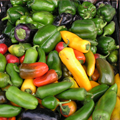This CSA farm directory lists Manitoba Community Supported Agriculture farms (also known as Community Shared Agriculture farms), their locations, contact information and websites. All CSA farmers in Manitoba can post their information on this directory, free of charge.

CSA Box
What are CSA farms?
Farms offering CSA programs are a convenient, affordable way to eat healthy, local foods. The concept is simple: You subscribe to the farm of your choice, by paying for a “share” at the beginning of the season. Then your CSA farm grows a wide variety of fruits and vegetables throughout the growing season, and delivers the produce each week to a pick up location near you.
With a CSA program, farmers are guaranteed the sale of their crop and their members enjoy a steady supply of freshly harvested, local, sustainably grown food. A typical CSA program runs 12 to 18 weeks, starting in mid to late June. While fruits and vegetables are most common, some CSA programs also offer eggs, honey, flowers, jams, poultry, and other meats.
Membership in a CSA creates relationships between people and the food they eat, the land on which it is grown and those who grow it. This supportive relationship helps to create an economically stable farm operation. The members receive high quality produce, often at below retail prices. In return, farmers are guaranteed a reliable market for a diverse selection of crops. This allows farmers to ensure proper land stewardship practices in order for the soil to be healthy for generations to come.

